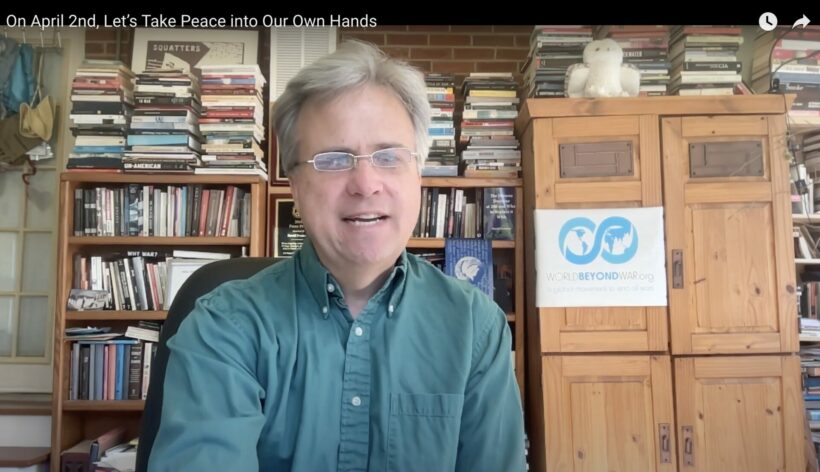Correction: I should have said Kansas, not Kentucky.
World BEYOND War supports getting in the streets everywhere on April 2nd for peace and nonviolent action with Europe for Peace. World BEYOND War members in Europe will spread the word and take part, and we will encourage our chapters around the world to join in.
I’m executive director of World BEYOND War, and I live in the United States where antiwar activism is most needed and least present. We have lots of excuses: the vast distances over which we are spread out, the intense propaganda in U.S. media, the economic insecurity. But none of them measure up against the need to preserve life on Earth in the face of a growing risk of nuclear war raised by people seemingly intent on destroying everything before the collapse of our ecosystems can do so. The epidemic of inactivism wasn’t always with us.
On April 2nd in 1935 thousands of U.S. students went on strike against war. College students in the mid to late 1930s grew up feeling the horrors of WWI throughout France, Great Britain, and the United States, believing that war benefitted no one, yet fearing another. In 1934, a U.S. protest including 25,000 students was held in remembrance of the day the U.S. entered WWI. In 1935, a “Student Strike Against War Committee” was started in the U.S. attracting an even larger movement of 700 students from Kentucky University joined by 175,000 more across the U.S., and thousands more around the world. Students from 140 campuses from 31 countries left their classes that day feeling: “protest against mass slaughter was more beneficial than an hour of class.” As concerns grew about Germany’s occupations, trouble between Japan and the Soviet Union, Italy and Ethiopia, the pressure built for students to speak out. At KU, Kenneth Born, a member of the debate team, questioned the $300 billion spent on World War I, arguing that “rationalism could bring a better solution.” While he was at the podium, the crowd was exposed to tear gas, yet Born persuaded the students to stay by declaring, “You will face worse than this in war.” Charles Hackler, a law student, described the demonstrations as reminders that “war was not inevitable,” calling the current ROTC parades “war propaganda for capitalists, munitions dealers, and other war profiteers.” As many of these same students were finally coerced into fighting and dying in Europe, Asia, and Africa during WWII, their words have become ever more poignant.
To hear those activists from April 2nd 1935 or to hear anyone in the West talking sense about Ukraine today, we have to wade our way through 80 years of accumulated WWII propaganda sludge. In the United States right now people believe that Putin is Hitler, that anyone violently fighting Hitler is the world’s savior, and that the world needs the help of U.S. weapons whether it knows it or not. If anyone can convince the U.S. public that they are qualified to say “No Thank you” it is Europeans. So we need to celebrate and amplify around the world every European voice that is saying Thanks but no thanks, keep your missiles, your tanks, your guns, and your planes. Leave us a planet.










